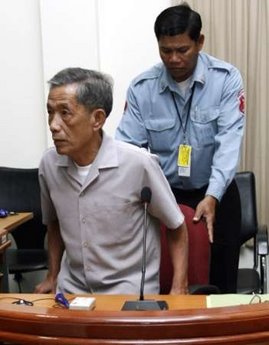
After getting myself up to date with the slow progress of the Khmer Rouge trials, I’ve put together a new article for the London-based libertarian magazine Spiked Online, which has since been published and ‘syndicated’ (i.e. copied and pasted) to a number of Cambodian news blogs. In my piece, I take a critical look at Western involvement in the trials, arguing that the international community’s commitment to impeccable standards of justice — as noble as it is — could end up derailing the tribunal process altogether.
While putting the Spiked piece together, I started forming some more involved theories about international war-crimes tribunals. First of all, I asked the most obvious question: what purpose are they intended to serve? There is often talk of bringing ‘justice’ to war-torn countries and ‘righting the wrongs’ of the past through fair and impartial trials. On the face of it, this makes plenty of sense. But in the context of international intervention, such an instrumental form of justice cannot avoid the taint of politics: after all, ‘wrongs’ can only be ‘righted’ if tribunals yield ‘guilty’ verdicts. Many international tribunals are therefore coloured by presuppositions of guilt which, while often right and just, belie their claim to total impartiality. This is hardly surprising, since there are many actors with a political stake in war-crimes tribunals: the ‘victors’, or those who rise to power in the wake of the war-criminals’ deposition, for whom the trials are an opportunity to legitimize the conflict or armed coup or foreign intervention that brought them to power; then there is the omniscient community of governments and international NGOs, which, in its goal of bringing ‘justice’ and accountability to unstable regions, requires that their involvement is vindicated with ‘results’. For both these groups, justice is a means to an end. It serves an overtly political function.
Now, this is arguably acceptable so long as the tribunal brings some tangible good to the country on whose behalf it has been established. It might, for instance, help heal the wounds of war and provide resolution for a dark chapter of a nation’s history. More specifically, it might also help train local magistrates in international legal procedure or serve notice to corrupt individuals that their days of living in impunity are over. However, the veneer of commitment to impartiality and due process — the pretence that any tribunal operates in a political vacuum — can compromise justice in two ways. Firstly, legal fastidiousness can delay the establishment and operation of a tribunal until most of the defendants are either dead or physically unfit for trial. This has been a major problem in Cambodia, where tortuous negotiations between the Hun Sen government and the United Nations Office of Legal Affairs delayed the establishment of a Khmer Rouge tribunal by six years. Even now, nearly eleven years after the Cambodians first requested legal aid from the UN, the trials are yet to get underway. The surviving Khmer Rouge leaders are frail, unhealthy octogenarians and may not live to see a verdict.
A second possibility is that the defendants might be legitimately acquitted. If a tribunal is really as impartial as it claims, and the defendants are given the full spectrum of rights of appeal and due process, they might be able to fudge and prevaricate their way to an acquittal or bog proceedings down with a unending string of procedural appeals. And while war-crimes or crimes against humanity usually leave ineradicable evidence, it can sometimes be difficult to pin them on particular individuals. Attenuated hierarchies of command often separate war-criminals from the effects of their actions on the ground, and it can be hard to prove individual culpability for crimes that were committed under the oversight of local leaders or involved verbal — that is, improvable — orders to subordinates. (As the judges at the 1945 Tokyo trials discovered, establishing ultimate responsibility for crimes against humanity is a thorny issue. Lacking firm evidence of personal culpability, the Allies resorted to hanging several Japanese generals for crimes of omission — i.e. for not enforcing discipline in the ranks).
Similarly, the defence may choose to take the path of legal obfuscation, binding the proceedings in so thick a web of red tape and legal appeals that any verdict will be delayed almost indefinitely. Both hypothetical outcomes demonstrate how legitimate trials can be rendered useless by the purity of their intentions. In the case of some international tribunals — and certainly in Cambodia’s — it may be that effective justice and fastidious impartiality are impossible to obtain in equal measure.
The function of a war-crimes tribunal must be clear and unambiguous from the outset. If a tribunal is to be legally pure, international governments and NGOs need to have patience and realise that it may not deliver the desired ‘outcomes’. If, on the other hand, governments are interested in the political effect that a successful prosecution might have, they’d do well to drop the pretence at impartiality and let justice be delivered swiftly and earnestly. However, no good (except, perhaps, a political one) is served by weaving a web of legitimacy for institutions that are inherently — though perhaps necessarily — flawed.
(As much as it pains me to admit it, Saddam Hussein’s trial was a good example of swift (and unabashedly political) justice, albeit one that was overshadowed by the sheer dangerous insanity of invading and occupying Iraq with barely 150,000 troops, disbanding the Iraqi army and then declaring ‘mission accomplished’ before the Ba’athist/Islamist/nationalist insurgents even had time to dust off their AK-47s. Now, if the Iraqi tyrant had been strung up by a Kurdish or Shi’ite militia rather than the gloating US military, I’m sure many anti-US commentators would be more tolerant of its legal shortcomings).


